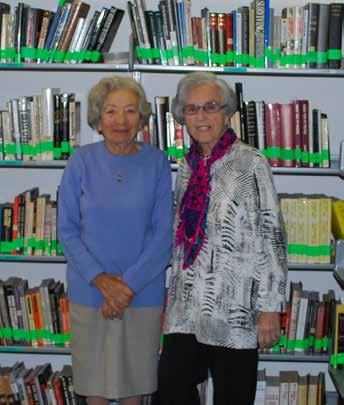
1 minute read
Rosa Freilich a
Treasured Mentor
Julia reichstein
Advertisement
Rosa was truly befittiNg of Her Name. sHe was nurturing and warm, yet ready to brandish her thorns should anyone dare challenge the wellbeing of her loved ones or ideals. Rosa’s quiet strength and convictions carried a presence that spoke volumes and enveloped one, yet she shunned attention and sought no accolades.
Rosa became my mentor in 2009 when I began working as a volunteer in the Jewish Holocaust Centre (JHC) library. had recently graduated with a library information management qualification.
When JHC curator Jayne Josem introduced me to the library, she said, ‘Rosa and Sabina have been in charge of the library since 1984. You won’t be allowed to touch anything but Rosa will be nice and will look after you!’

My first day working with Rosa and library co-founder Sabina Josem was 15 June 2009. As Jayne predicted, Rosa was quite lovely to me, but and I was not permitted to touch anything! ‘I will tell you when you are ready to touch the books,’ Rosa declared.
What unfolded over the course of our four years working together was a relationship echoing The Karate Kid. Rosa said ‘no’ to me often, forbade me to use the computer and ensured that I earned every new task.
‘Rosa, could I please borrow books?’
‘Julie (never Julia), you will borrow, darling, but not today. You are not ready.’
‘Rosa, I’d really like to learn how to catalogue.’
‘No Julie. First you will stamp the books. You need to read them before you can describe them.’
‘Rosa, I’m just going to take some notes about the collection.’
‘No, Julie.’
‘I just wish to understand more – about the material, about the Holocaust.’
‘Julie, put your pen down. What will your notes tell you? You will never know anything about being in the Holocaust. You can’t learn it. You need to remember it happened. And you need to help tell others.’
One of the hardest lessons came one morning in 2010 when Rosa reprimanded me for the way phrased something:
‘Julie, why did you say 1.5 million children died in the Holocaust?’
‘I read the statistic in …’
‘No, not the number. Why did you say they died?’
‘I… I don’t understand, Rosa.’
‘No Jewish child died Julie. They were murdered. Old people die. Sick people die. Children don’t die. You need to think about your words... You are not ready to catalogue.’
It all left me quite bewildered, but each week returned to Rosa.
It would take a major event in my life later that year – the loss of







